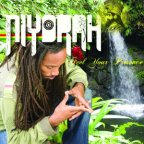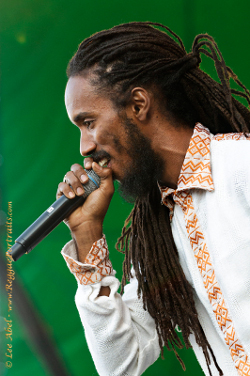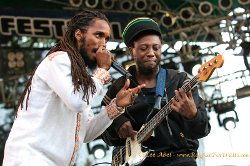Articles about reggae music, reviews, interviews, reports and more...
Interview: Niyorah
- Home
- Articles
- Interviews
- Interview: Niyorah

Interview: Niyorah
"Within the five years I’ve reached more spiritual maturity overall."
Sampler
Nigel "Niyorah" Olivacce was born in Dominica but raised in the U.S. Virgin Islands on St. Thomas. Since his early days with Star Lion Family (a collective of seven V.I. artists including the one Pressure Busspipe), through the releases of his first two albums, a “mixtape” project with Oakland-based producer DJ Child of Project Groundation Massive and his most recent album, 'Feel Your Presence' (his first to be produced in Jamaica), Niyorah has shown tremendous promise and progress alike. Boasting the melodic chanting style characteristic of V.I. roots reggae; unabashed explorations in hip-hop and r&b; conscious spirituality; and critical social and political commentaries, Niyorah’s music is, as it should be, an open window into what he knows best: From his upbringing with a renowned Caribbean Bush Doctor father, through a lineage that traces back through generations of a musical ancestry. In early August, Jessica Dore talked with the artiste via cell phone from Oakland down to a boat in the Caribbean, from which Niyorah answered a few questions while cruising from one island to another just before he left the crystal waters for his “Feel Your Presence” tour.

Where are you based now?
I’m actually based in the Virgin Islands, but I have different bases throughout the world, but my main base is in the V.I. but I do have a place in California, Dominica, you know?
When you were growing up, what kind of music was influencing you?
Bob Marley, Dennis Brown, Bunny Wailer, Peter Tosh, etcetera, but as for my inspirations, Bob Marley as a male artist, and Lauryn Hill as a female artist.
So you were listening to a lot of roots reggae but then you’ve got the hip-hop influence too…
Yeah, I try not to have myself in a box, you know?
In 2005, you came out with A Different Age, and I wonder how you feel you’ve changed, personally and professionally as an artist since then?
In terms of knowledge, in terms of production I’ve definitely grown. I’ve made a lot more links so I have so many different producers around me and engineers and experts of what they do, you know? Since I’ve been travelling I’ve been to different places, experiencing different things, different music, and it’s opened my mind to the knowledge of the process of production itself. So that’s the blessing within itself.
How about personally?
Yeah within the five years I’ve reached more spiritual maturity overall. As you know, life is everlasting and the realms begin to open, and those realms are unlimited. So spiritually I’ve grown within the five years.
How would you compare your latest album, Feel Your Presence, with your older albums, A Different Age and Purification Session?
 Well you know, the first difference with the album Feel Your Presence is that the others were produced in the Virgin Islands, this time it was produced in Jamaica, and it was produced by Andrew Bassie Campbell. So, it was produced on my label, Denkenesh Records. The music and everything was done under the management of Bassie, from Kingston, Jamaica. And then I also had very powerful masters of Jamaica on there too. I have the late great Sugar Minott, who just passed. And the special thing about this album, “World A Jungle,” the track that I did with Sugar Minott, that was actually one of the few last that he did before he passed on.
Well you know, the first difference with the album Feel Your Presence is that the others were produced in the Virgin Islands, this time it was produced in Jamaica, and it was produced by Andrew Bassie Campbell. So, it was produced on my label, Denkenesh Records. The music and everything was done under the management of Bassie, from Kingston, Jamaica. And then I also had very powerful masters of Jamaica on there too. I have the late great Sugar Minott, who just passed. And the special thing about this album, “World A Jungle,” the track that I did with Sugar Minott, that was actually one of the few last that he did before he passed on.
And tell me about that experience, working with a legend like Sugar?
Good, good, good. A blessing. Humbling because that’s an artist that I love so much. And then also, [I worked with] one of the greatest musicians in the reggae industry, Horsemouth Wallace, he was actually a part of that, and then Chinna Smith.
Was it at all intimidating to work with guys that have worked with Dennis Brown and Bob Marley and some of those guys?
All is well and all is positive, you know?
Tell me about Star Lion Family and how you came to be a part of this group and what Star Lion Family is about.
 Star Lion Family is just about the ghetto youths coming together. Because, you know, each member of Star Lion Family was from different parts of the island, different ghettos on the island, and us coming together really created a ripple through the whole community because you know we came to do something positive. So I think a lot of the youth looked up to us in that sense. In terms of the group, we came together about twelve years ago in 1998, just for musical passion. What we did decide, several years ago, was that it would be much more intelligent and wise to actually have each member pursue a solo career. Star Lion isn’t like, a band, but just a group of artists that strive to preach the word, you know? We came together in 1998 because we were all solo artists before actually, and we decided to form the group to create the energy.
Star Lion Family is just about the ghetto youths coming together. Because, you know, each member of Star Lion Family was from different parts of the island, different ghettos on the island, and us coming together really created a ripple through the whole community because you know we came to do something positive. So I think a lot of the youth looked up to us in that sense. In terms of the group, we came together about twelve years ago in 1998, just for musical passion. What we did decide, several years ago, was that it would be much more intelligent and wise to actually have each member pursue a solo career. Star Lion isn’t like, a band, but just a group of artists that strive to preach the word, you know? We came together in 1998 because we were all solo artists before actually, and we decided to form the group to create the energy.
 Star Lion Family is just about the ghetto youths coming together. Because, you know, each member of Star Lion Family was from different parts of the island, different ghettos on the island, and us coming together really created a ripple through the whole community because you know we came to do something positive.
Star Lion Family is just about the ghetto youths coming together. Because, you know, each member of Star Lion Family was from different parts of the island, different ghettos on the island, and us coming together really created a ripple through the whole community because you know we came to do something positive.
So your first two albums were produced in the Virgin Islands and Feel Your Presence was the first in Jamaica.
Purification Session and A Different Age were between New York and the Virgin Islands, and for Stolen Scrolls we actually went to Oakland to create that whole vibe with Project Groundation.
So tell me about the significance of going to Jamaica for your third album.
Jamaica to me is highly, highly significant. Jamaican artists, and the land of Jamaica, the energy of Jamaica, inspire the world, and also have inspired me too. So going to Jamaica is like giving respect at the foundation, for a very long time, you know?
 Jamaica to me is highly, highly significant. Jamaican artists, and the land of Jamaica, the energy of Jamaica, inspire the world, and also have inspired me too.
Jamaica to me is highly, highly significant. Jamaican artists, and the land of Jamaica, the energy of Jamaica, inspire the world, and also have inspired me too.
When did you go to Jamaica for the first time?
Oh just for the first time a few years ago.
And what was your first impression when you went there?
Well you know them people they’re going through a struggle. It’s 90 dollars to 1 US dollar. The people are not well taken care of in terms of, you know the government, and in terms of the financial standing of the nation, it’s just a real struggle. So what you find is that the wages are low, and the people there are going through a struggle. All the talk that people talk about, the violence, I and I can see why, because people literally starve at times, you know. Hungry belly, you know what I mean. So it’s just a humbling experience because sometimes you think things rough and so, but people are really being taken advantage of. But in terms of the music, people who live in Jamaica give and show I and I enough love and support, love and respect.
Your label is called Denkenesh. Tell me about how you chose the name.
It means the first one of all humans, because Denkenesh is the same name as who the English call Lucy. People say that human beings only exist for thousands of years, but when they found her, and they carbon dated her, she was like 3.5 million years old. Just shows you that we have been here. The concept is that she was found in Ethiopia, the English call her Lucie but the Ethiopians call her Denkenesh, so she is known, she is related to everyone on the planet, literally.
So your song, Capture the Moment, was featured on the project Gather the Remnant, which was produced by Bassie Campbell. And then he produced your latest album. Was Gather the Remnant the beginning of the link between you two?
 Yes, well I was introduced to Andrew Bassie Campbell from Conscious Riddims Records from Kona, Hawaii. And Conscious Riddims went in Jamaica and I gave like two promotional presentations, and so after going to Jamaica we linked, and we felt the good vibes and we started working around and talking and said that basically I and I would like to work with him. And so I went to Jamaica about, seven times back and forth until the album was done.
Yes, well I was introduced to Andrew Bassie Campbell from Conscious Riddims Records from Kona, Hawaii. And Conscious Riddims went in Jamaica and I gave like two promotional presentations, and so after going to Jamaica we linked, and we felt the good vibes and we started working around and talking and said that basically I and I would like to work with him. And so I went to Jamaica about, seven times back and forth until the album was done.
So tell me about the birth and conception of the Stolen Scrolls mixtape with DJ Child.
Well basically we are taking the same songs and adding different riddims to it. It’s “a mixtape album” which is very unique and original, you know. It’s something that we attempted to create; a mixtape that is legal. It’s just something unique and original. If someone is an asset to me, and I’m an asset to them, then it just makes sense to do the work. So, the significance of the Oakland vibe is just that, here we are, totally in a different part of the world and we come together to just create a positive work, you know.
 If someone is an asset to me, and I’m an asset to them, then it just makes sense to do the work. So, the significance of the Oakland vibe is just that, here we are, totally in a different part of the world and we come together to just create a positive work, you know.
If someone is an asset to me, and I’m an asset to them, then it just makes sense to do the work. So, the significance of the Oakland vibe is just that, here we are, totally in a different part of the world and we come together to just create a positive work, you know.
And on that note, you’re very rootsy but also you illustrate more of an openness to other styles, like hip-hop.
Yeah man, I love Common, I feel an energy from other hip-hop artists too, and the way they express themselves too, you know. You have Dead Prez, even KRS-1 from back in the day.
One of the things you talk about a lot in your songs is ital living, eating whole foods, yoga and healthy practices…Were you raised with these ideals?
Well, my father is a bush doctor. He is the most popular Bush Doctor in the whole entire Caribbean. So I got teachings about health from when I was a little boy, you know. It’s all about connection, body, mind and spirit connection. You have to start with the body. Once the body is purified then the mind will be, then the spirit will be. But people have to stop talking about God, they have to feel what God is and who God is.
 You have to start with the body. Once the body is purified then the mind will be, then the spirit will be
You have to start with the body. Once the body is purified then the mind will be, then the spirit will be
It’s not that “Oh I actually believe in God, and God is this person, or that person,” but they feel God. So, we eat the way we eat because basically when we eat that way we have the live enzymes in our body, which destroy negative sequences within our body, but we also eat to feel right and so organic food is definitely the way to go. No GMOs, no clones, none of that stuff. Just things natural, of the most high.
Photos copyright Lee Abel 2009 - Niyorah at Reggae Rising 2009
Reproduction without permission of United Reggae and Lee Abel is prohibited.
Read more about this topic
Comments actually desactivated due to too much spams
Browse by categories
Recommended Articles
Latest articles
Recently addedView all
© 2007-2026 United Reggae. All Rights Reserved. Reproduction in whole or in part is prohibited. Read about copyright
Terms of use | About us | Contact us | Authors | Newsletter | A-Z














